The AMD Threadripper 2 CPU Review: The 24-Core 2970WX and 12-Core 2920X Tested
by Ian Cutress on October 29, 2018 9:00 AM ESTGaming: Grand Theft Auto V
The highly anticipated iteration of the Grand Theft Auto franchise hit the shelves on April 14th 2015, with both AMD and NVIDIA in tow to help optimize the title. GTA doesn’t provide graphical presets, but opens up the options to users and extends the boundaries by pushing even the hardest systems to the limit using Rockstar’s Advanced Game Engine under DirectX 11. Whether the user is flying high in the mountains with long draw distances or dealing with assorted trash in the city, when cranked up to maximum it creates stunning visuals but hard work for both the CPU and the GPU.
For our test we have scripted a version of the in-game benchmark. The in-game benchmark consists of five scenarios: four short panning shots with varying lighting and weather effects, and a fifth action sequence that lasts around 90 seconds. We use only the final part of the benchmark, which combines a flight scene in a jet followed by an inner city drive-by through several intersections followed by ramming a tanker that explodes, causing other cars to explode as well. This is a mix of distance rendering followed by a detailed near-rendering action sequence, and the title thankfully spits out frame time data.
| AnandTech CPU Gaming 2019 Game List | ||||||||
| Game | Genre | Release Date | API | IGP | Low | Med | High | |
| Grand Theft Auto V | Open World | Apr 2015 |
DX11 | 720p Low |
1080p High |
1440p Very High |
4K Ultra |
|
There are no presets for the graphics options on GTA, allowing the user to adjust options such as population density and distance scaling on sliders, but others such as texture/shadow/shader/water quality from Low to Very High. Other options include MSAA, soft shadows, post effects, shadow resolution and extended draw distance options. There is a handy option at the top which shows how much video memory the options are expected to consume, with obvious repercussions if a user requests more video memory than is present on the card (although there’s no obvious indication if you have a low end GPU with lots of GPU memory, like an R7 240 4GB).
All of our benchmark results can also be found in our benchmark engine, Bench.
| Game | IGP | Low | Medium | High |
| Average FPS | 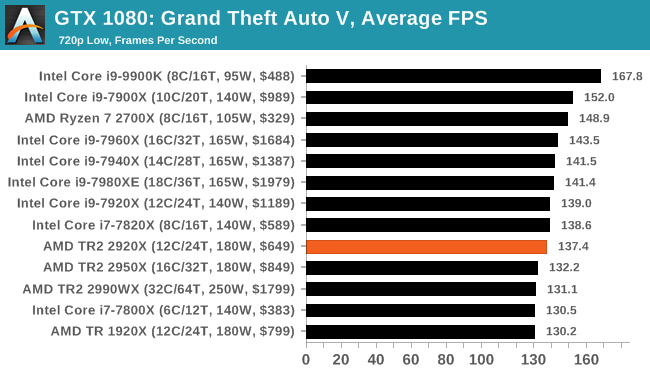 |
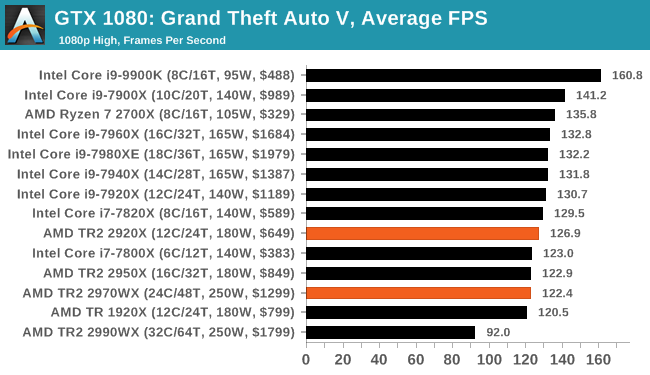 |
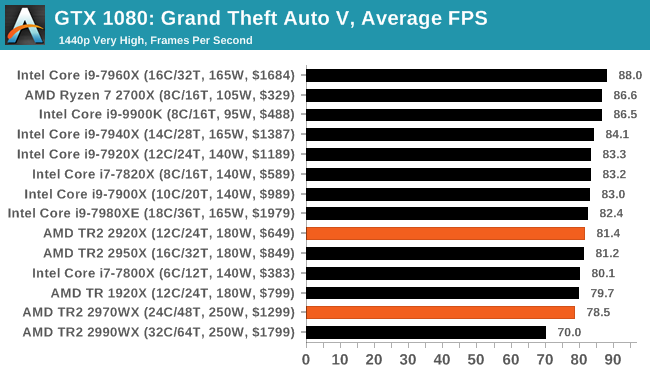 |
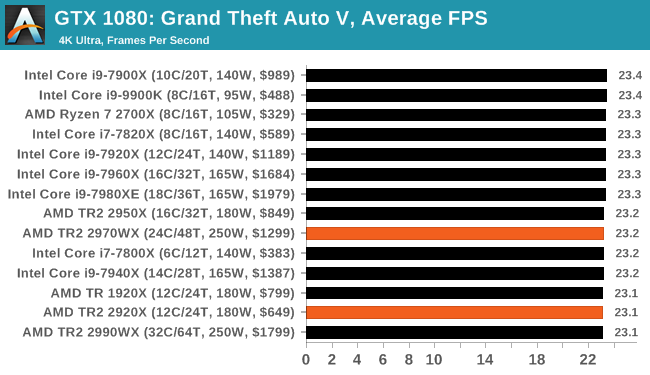 |
| 95th Percentile | 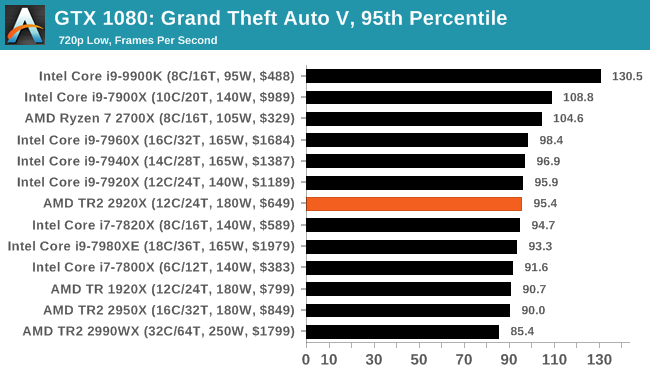 |
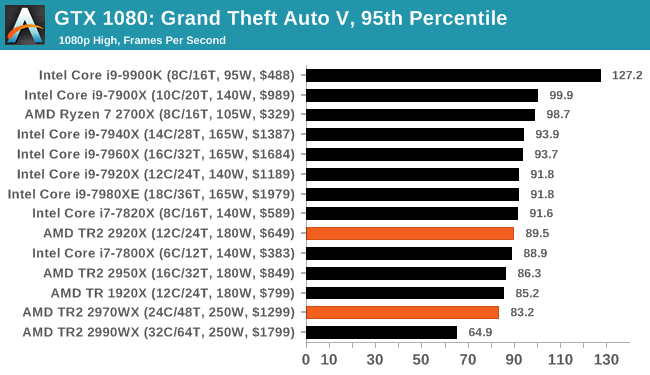 |
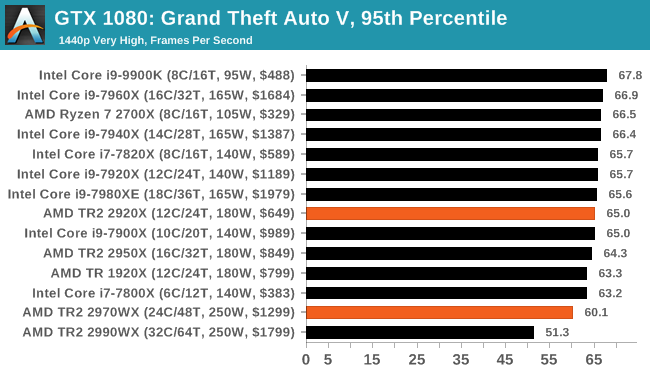 |
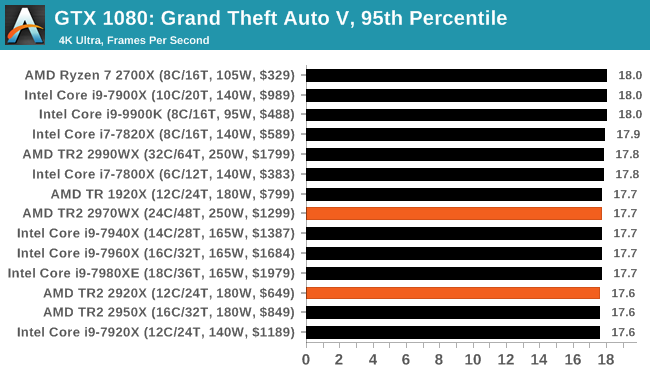 |


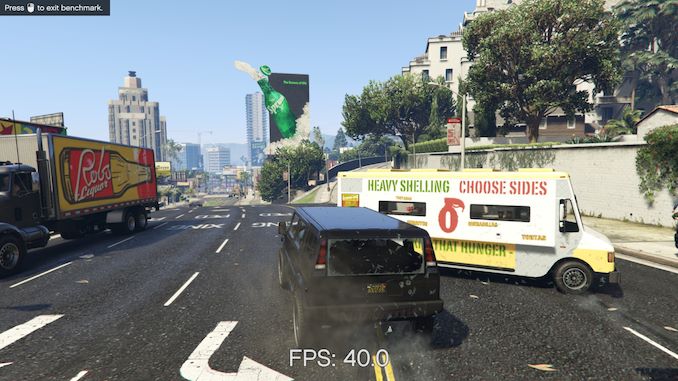









69 Comments
View All Comments
snowranger13 - Monday, October 29, 2018 - link
On the AMD SKUs slide you show Ryzen 7 2700X has 16 PCI-E lanes. It actually has 20 (16 to PCI-E slots + 4 to 1x M.2)Ian Cutress - Monday, October 29, 2018 - link
Only 16 for graphics use. We've had this discussion many times before. Technically the silicon has 32.Nioktefe - Monday, October 29, 2018 - link
Many motherboards can use that 4 additionnal lanes as classic pci-ehttps://www.asrock.com/mb/AMD/B450%20Pro4/index.as...
mapesdhs - Monday, October 29, 2018 - link
Sure, but not for SLI. It's best for clarity's sake to exclude chipset PCIe in the lane count, otherwise we'll have no end of PR spin madness.Ratman6161 - Monday, October 29, 2018 - link
Ummm...there are lots of uses for more PCIe besides SLI ! Remember that while people do play games on these platforms, it would not make any sense to buy one of these for the purpose of playing games. You buy it for work and if it happens to game OK then great.TheinsanegamerN - Tuesday, October 30, 2018 - link
Is it guaranteed to be wired up to a physical slot?No?
then it is optional, and advertising it as being guaranteed available for expansion would be false advertising.
TechnicallyLogic - Thursday, February 28, 2019 - link
By that logic, Intel CPUs have no PCIE slots, as there are LGA 1151 Mini STX motherboards with no x16 slot at all. I think a good compromise would be to list the CPU as having 16+4 PCIE slots.Yorgos - Friday, November 2, 2018 - link
for clarity's sake they should report the 9900k at 250Watt TDP.selective clarity is purch media's approach, though.
2700x has 20 pcie lanes, period. if some motherboard manufacturers use it for nvme or as an extra x4 pcie slot, it's not up to debate for a "journalist" to include it or exclude it, it's fucking there.
unless the money are good ofc... everyone has their price.
TheGiantRat - Monday, October 29, 2018 - link
Technically the silicon of each die has total of 128 PCI-E lanes. Each die on Ryzen Threadripper and Epyc has 64 lanes for external buses and 64 lanes for IF. Therefore, the total is 128 lanes. They just have it limited to 20 lanes for consumer grade CPUs.atragorn - Monday, October 29, 2018 - link
Why are the epyc scores so low across the board? I dont expect it to game well but it was at the bottom or close to it for everything it seemed